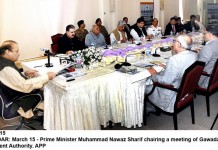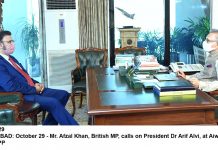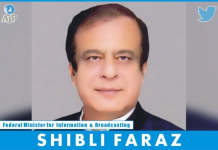مضمون کا ماخذ : Thống kê giải đặc biệt theo tổng
Aid cuts will hurt US more: Abbasi
ISLAMABAD: Prime Minister Shahid Khaqan Abbasi Monday said it would be counter-productive for the United States to sanction Pakistani officials or further cut military assistance, warning it would hurt both countries’ fight against militancy. “We are fighting the war against terror, anything that degrades our effort will only hurt the US effort,” Abbasi said in […]
ISLAMABAD: Prime Minister Shahid Khaqan Abbasi Monday said it would be counter-productive for the United States to sanction Pakistani officials or further cut military assistance, warning it would hurt both countries’ fight against militancy.
“We are fighting the war against terror, anything that degrades our effort will only hurt the US effort,” Abbasi said in an interview in Islamabad on Monday. “What does it achieve?” he said, adding that any targeted sanctions by Washington against Pakistani military and intelligence officials would not help US counter-terrorism efforts.
US-Pakistan relations have frayed since President Donald Trump last month set out a new Afghanistan policy and lashed out at nuclear-armed Pakistan as a fickle ally that gives safe haven to ‘agents of chaos’ by harbouring the Afghan Taliban and other militants.
The United States has already begun conditioning future aid to Pakistan on progress Islamabad makes in tackling the Haqqani network, who it alleges are Pakistan-based and have helped the Taliban carry out deadly attacks inside Afghanistan.
Washington’s civilian and military assistance to Pakistan was less than $1 billion in 2016, down from a recent peak of $3.5 billion in 2011, and Abbasi warned that Washington will not achieve its counter-terrorism aims by starving Pakistan of funds. “If the military aid cuts degrade our effort to fight war on terror, who does it help?” he said. “Whatever needs to be done here, it needs to be a cooperative effort.”
Abbasi said one practical side-effect of military aid cuts and US Congress blocking the sale of subsidized F-16 fighter jets to Pakistan will be to force Islamabad to buy weapons from China and Russia. “We’ve had to look at other options to maintain our national defensive forces,” he said.
“We have a major economic relationship with (China), we have a major military relationship since the 1960s, so that’s definitely one of our options,” he said.
Abbasi said it was “unfair” to blame Pakistan for all the troubles in Afghanistan, saying Washington should show more appreciation for Pakistan’s losses from militancy and its role in hosting 3.5 million Afghan refugees.
He added that Afghan-based militants have also launched cross-border attacks on civilians and military in Pakistan, prompting Pakistan to begin investing ‘several billion dollars’ to fence the porous 2,500 km border.
“We intend to fence the whole border to control that situation,” Abbasi added.
Abbasi also faces growing headwinds on the economy ahead of a general election, likely in mid-2018. He said Islamabad was looking at a raft of measures to alleviate current account pressures to avoid going back to the IMF, including reducing imports of luxury goods, boosting exports, and possibly devaluing its currency.
Finance Minister Ishaq Dar is a staunch opponent of a weaker rupee – whose level against the dollar is effectively controlled by the central bank – but Abbasi said it had been discussed. “There are pros and cons to devaluation, but that could be a decision we take,” he said, adding that any devaluation would not be drastic, and “today, it’s not on the table yet.”
Abbasi, who has hinted his former boss remains the power behind the throne by repeatedly calling him ‘the people’s prime minister’, said the three-time premier remains hugely popular despite his disqualification by the Supreme Court on July 28. “Politics is not decided in courts,” said Abbasi, who was jailed along with Sharif after the 1999 military coup. “Politically, Nawaz Sharif is stronger today than he was on July 28.”
Abbasi is also pushing ahead with a wide-ranging tax reform agenda before the elections – a tough task in a nation that has one of the world’s lowest tax-to-GDP ratios and where tax evasion is rampant and often culturally acceptable.
The ruling PML-N party is looking for cross-party support for the reforms, but Abbasi said radical changes would require an integrated approach, including building confidence among tax payers, reducing income taxes and making it less attractive to invest in a real estate sector that attracts black money. “You not only need to have a stick, you need to have a carrot also,” he said.
Published in Daily Times, September 12th 2017.











